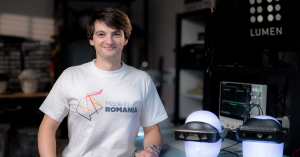What does it take for a Bulgarian company to become a global leader in deep technologies? How are semantic technologies and natural language processing applied in the field of Life Science and Healthcare and why do pharma companies need text analytics?
The Bulgarian AI technologies provider Ontotext recently opened an office in Basel, Switzerland, known as the capital of healthcare and life science development. The move follows the company’s aim to expand vertically in three main domains – healthcare and life sciences, financial services (including insurance), and industry (electricity, automotive, aerospace, and building automation).
Ontotext has two main offices in Bulgaria that focus on operations, R&D, and sales, located in Sofia and Ruse. Besides the new office in Basel, the company also has an office in New York.
The company’s accelerated growth plan includes recruiting more domain experts in the new verticals and growing its partnership network by creating an ecosystem of tech companies from different countries which complement each others’ technology offerings. Ontotext is already working closely with companies from the DACH regions, Spain, France, India, USA.
The Recursive talked with Milen Yankulov, Marketing Director of Ontotext to better understand the complex solutions of the company and explore how they apply text analytics in the healthcare and life sciences field.
The Google of pharma companies
Semantic technology is a branch of AI, and text analytics and NLP are types of semantic technologies. As Ontotext is one of the few companies worldwide that are focusing on this market niche, it has been recognized as one of the leaders in semantic technologies.
Its flagship product is GraphDB. It is an alternative for the traditional SQL databases and it relies on the graph theory of connecting all kinds of data. GraphDB serves as a central data store that allows businesses to build big knowledge graphs, to deliver complex solutions for content and knowledge discovery.
“Knowledge graphs work the same way in which the brain makes connections and correlations between facts and contexts to finally reach some reasoning. These graphs can be visually represented as the right-hand sidebars of Google which organize basic facts and information about the object that we are researching. Therefore, in simple terms, Ontotext develops proprietary Google-like search engines for organizations,” shares Yankulov.
Ontotext already works with most of the pharma companies that are represented in Basel as well as with some of the most innovative biotech and healthcare startups.
“Our technologies finally came to the spotlight for commercial use and more people are now capable of understanding and using our products and solutions”, Yankulov remarks. For ages enterprises and players in the life sciences and healthcare domains have been publishing and using a lot of openly available data about genomics, proteomics, metabolomics, molecular interactions, and biological processes, as well as pharmacology, clinical, medical, and scientific publications, and more. This is where we found the potential of our solution to be applicable,” Yankulov shares.
He explains that everything that has been discovered and researched in the life sciences field is well-organized in publicly available datasets. Therefore, pharma organizations can use that data, in order to connect it to their own data. Pharma companies have a lot of proprietary data from research, tests, and focus groups, but they usually don’t organize it well. This explains what is the use case for Ontotext’s solutions in pharma companies – to normalize, structure, and integrate all that data in order to be discoverable and reusable.
“When we are approached by a client from the life sciences industry, they usually say that they have a lot of unstructured and siloed data from different datasets that they want to organize in one application that can be easily navigated by its users. This means that we need to create a search engine. We are able to normalize all of the information in standardized formats and integrate it in the search engine,” Yankulov explains.
The 21-years-long story of Ontotext
Ontotext was founded in 2000 by Atanas Kiryakov who at that time was a software engineer and project manager in Sirma, one of the biggest Bulgarian software companies. He started experimenting with text analytics techniques and applying them to various industries different from academics and research. He realized that there was a market potential to turn text analytics and natural language processing techniques into a commercial business. That is how, in the beginning, Ontotext started as an intrapreneurship project, more specifically as the R&D department within Sirma Group.
Later, the department spun off from the Holding after it raised funding from Bulgarian venture capital fund NEVEQ. Ontotext aimed to position itself as a global brand right from the start. The first big project came right after the spin-off. Ontotext was chosen to develop the sports section of BBC and it offered a content generation solution that was dynamically updated and personalized, depending on the preferences of the users.
The next big client for Ontotext was Financial Times which used the analytics services of the Bulgarian company to optimize their subscription model. In 2019, Sirma Holding fully acquired Ontotext. Thus, Ontotext was rebranded as Sirma.ai, serving as core of the Enterprise AI strategy of Sirma holding.







